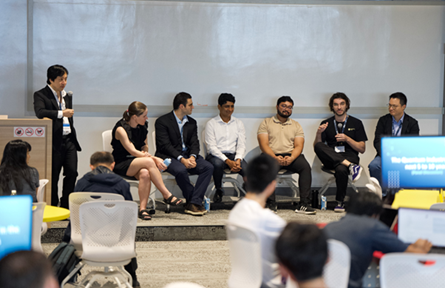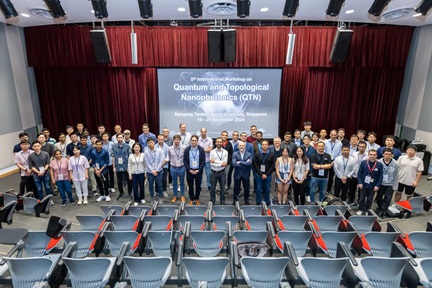A Conversation with Nobel Laureate Prof Duncan Haldane
Written by Navaratna Nikhil | PhD student, SPMS NTU
The Institute of Advanced Studies (IAS) and School of Physical and Mathematical Sciences (SPMS) at Nanyang Technological University hosted a conversation with Prof Duncan Haldane (Nobel Laureate in Physics 2016) on 13 January 2025. The session brought together NTU scholars and PhD students for an informal discussion, fostering a dynamic exchange of ideas, anecdotes, and inspiration. Prof Yang Bo (SPMS, NTU), the moderator of the session, began by introducing Prof Haldane and his pioneering contributions to topological physics.

Prof Duncan Haldane conversing with Asst Prof Yang Bo (right), the moderator of the dialogue session.
The discussion opened with how Prof Haldane linked abstract mathematical concepts like topology to the tangible properties of real materials. He explained how topological concepts, which describe properties that remain unchanged under deformation, emerged in classical and quantum physics. Prof Haldane also shared how his independent research journey converged on these ideas. When asked about the future of topological materials, Prof Haldane highlighted their potential for forming topological qubits in quantum computing architectures that are more scalable, coherent, and energy-efficient. He emphasised how these materials could mitigate the growing power demands of internet infrastructure and AI models.
The conversation turned to the 2024 Nobel Physics Prize. Prof Haldane, drawing from his connection with Prof John Hopfield, reflected on the recognition of Hopfield networks, rooted in spin glasses. A resonant question followed, asking about his experiences with work being rejected thrice. Prof Haldane’s response was inspiring: “Unless you think you are randomly guessing, you should believe your work.” He emphasised the universal nature of physics and the importance of applying knowledge across fields. Both Prof Haldane and Prof Yang Bo urged students to attend seminars on cross-disciplinary topics, sharing how a seminar on photonic crystals inspired Prof Haldane’s work on photonics.
A fundamental question about the definition of a phase led Prof Haldane to describe it as a state of matter with distinct behaviour, highlighting how fascinating phenomena often occur at boundaries. On the interplay between physics and mathematics, Prof Haldane noted that while mathematics provides abstraction and rigor, physicists unify it with physical phenomena, requiring strategic thinking to choose suitable frameworks. He also acknowledged how modern high-performance computing has simplified complex calculations.

Prof Haldane addressing thought-provoking questions from aspiring young researchers.
Addressing young researchers, Prof Haldane stressed the importance of pursuing interesting questions, and that science must never be a chore. He encouraged openness to unexpected approaches, likening research to walking a path, kicking up dust, and occasionally finding a diamond. As he succinctly put it, "You need persistence and luck”, noting that researchers can create opportunities by choosing their paths wisely. He also highlighted the interdisciplinary application of knowledge, stating that insights from mature fields can spark advancements in nascent areas.
The discussion then veered deeper into the nature of research, with one student posing how will we know if we found the right question. Prof Haldane suggested that identifying the right questions is the essence of science, contrasting it with solving problems, which he likened to a homework exercise. He emphasised iterative questioning as key to discovery. A relatable question followed about overcoming obstacles when feeling stuck. Prof Haldane shared that stepping away and engaging in constructive activities can help and stressed the value of having multiple problems to focus on. He credited teaching as a trigger for new insights into challenging problems. The discussion concluded with a question on whether research problems can ever be fully solved. Prof Haldane suggested that formulating problems continuously is vital, and that to reduce things to a simple result is the goal.
The session ended with warm applause, with some audience members continuing discussions with Prof Haldane over refreshments. His passion for science and engaging insights inspired the audience to boldly explore the wonders of research, deepening their understanding of the interplay between physics, mathematics, and natural phenomena.














/enri-thumbnails/careeropportunities1f0caf1c-a12d-479c-be7c-3c04e085c617.tmb-mega-menu.jpg?Culture=en&sfvrsn=d7261e3b_1)

/cradle-thumbnails/research-capabilities1516d0ba63aa44f0b4ee77a8c05263b2.tmb-mega-menu.jpg?Culture=en&sfvrsn=1bc94f8_1)






